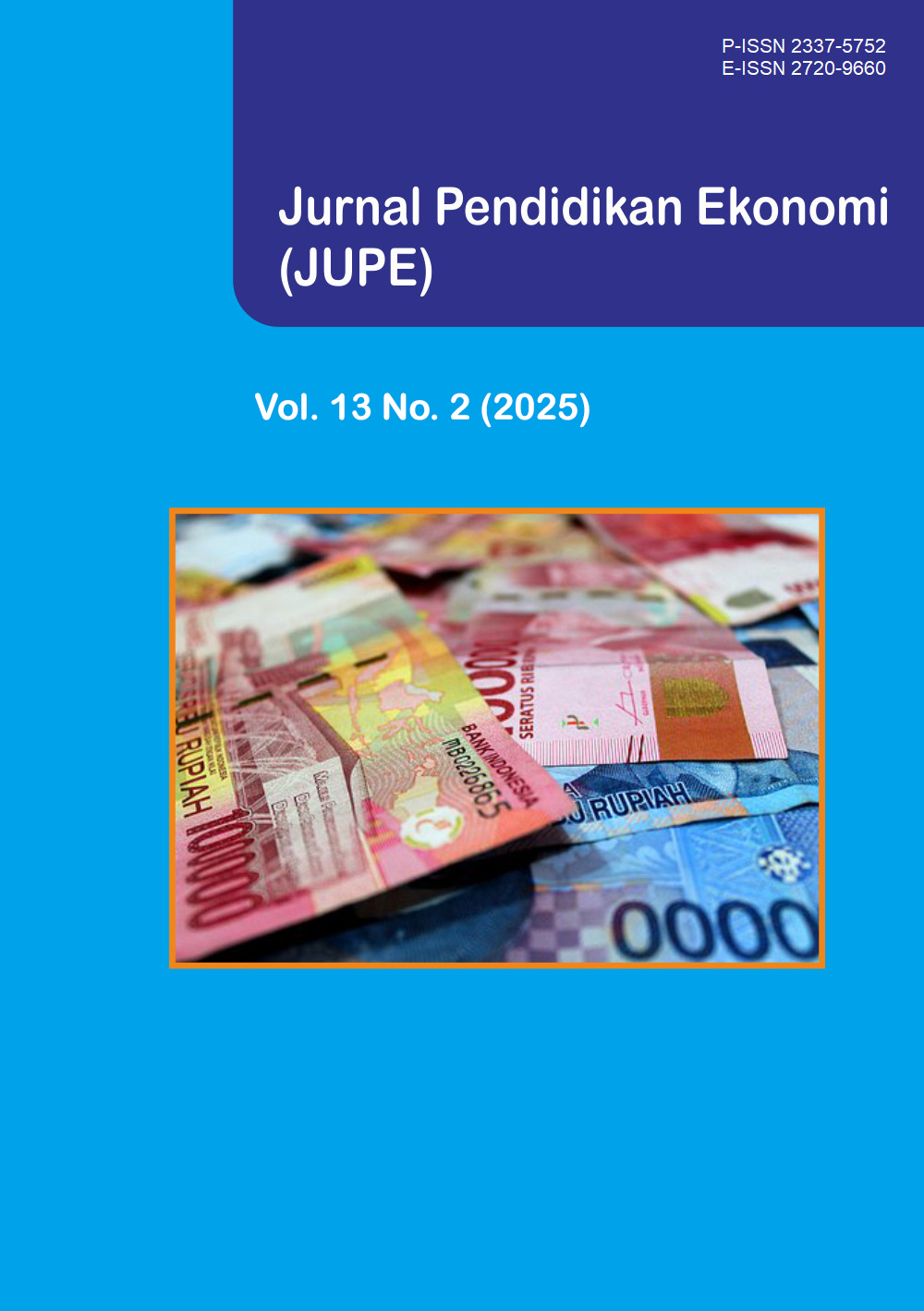Pengaruh aspek afektif terhadap prestasi akademik mahasiswa
DOI:
https://doi.org/10.26740/jupe.v13n2.p116-126Keywords:
affective aspects, academic achievement, motivationAbstract
This study is motivated by the phenomenon that student academic achievement is not only determined by cognitive abilities, but also influenced by affective aspects such as motivation, self-confidence, emotional regulation, and academic engagement. This study aims to determine and analyze the influence of affective aspects on student academic achievement. This study uses a quantitative approach with a survey method. The number of samples used was 185 students using the slovin formula, a simple linear regression analysis tool which became the analysis technique. The results showed that there is a positive and significant influence between affective aspects on student academic achievement. This finding also shows the importance of maximizing affective aspects in improving academic achievement and supporting student academic success.
Downloads
References
Adam, F. (2021). Prestasi belajar mahasiswa PGSD STKIP Melawi Entikong ditinjau dari aspek kognitif masa pandemi COVID-19. Jurnal Pembelajaran Prospektif, 8, 1–7.
Alvarez, A., Pérez-González, J. C., & Sánchez-Ruiz, M. J. (2019). Emotional intelligence and academic performance in university students: A meta-analytic investigation. Frontiers in Psychology, 10, 2906.
Bloom, B. S. (1956). Taxonomy of educational objectives: The classification of educational goals. David McKay Company.
Brackett, M. A., Rivers, S. E., & Salovey, P. (2016). Emotional intelligence: Implications for personal, social, academic, and workplace success. Social and Personality Psychology Compass, 10(1), 88–103.
Cassady, J. C., & Finch, W. H. (2015). The impact of cognitive test anxiety across the learning-testing cycle. Learning and Instruction, 37, 1–9.
Cohen, J., McCabe, E. M., Michelli, N. M., & Pickeral, T. (2020). School climate: Research, policy, teacher education and practice. Teachers College Record, 122(4), 1–36.
Conley, D. T. (2015). A new era for educational assessment. Education Policy Analysis Archives, 23(8).
Deci, E. L., & Ryan, R. M. (1985). Intrinsic motivation and self-determination in human behavior. Plenum Press.
Deci, E. L., & Ryan, R. M. (2017). Self-determination theory: Basic psychological needs in motivation, development, and wellness. Guilford Press.
Domitrovich, C. E., Durlak, J. A., Staley, K. C., & Weissberg, R. P. (2017). Social-emotional competence: An essential factor for promoting positive adjustment and reducing risk in school children. Child Development, 88(2), 408–416.
Durlak, J. A., Domitrovich, C. E., Weissberg, R. P., & Gullotta, T. P. (2017). Handbook of social and emotional learning: Research and practice. Guilford Publications.
Efendi, A., & Utami, E. (2022). Bagaimana kompensasi memoderasi pengaruh disiplin kerja dan budaya organisasi terhadap produktivitas kerja karyawan. Kinerja: Jurnal Ekonomi dan Manajemen, 19(3), 487–496. https://doi.org/10.29264/jkin.v19i3.11504
Fredricks, J. A., Wang, M. T., Schall Linn, J., Hofkens, T. L., & Allerton, J. (2016). Using qualitative methods to develop a survey measure of math and science engagement. Learning and Instruction, 43, 5–15.
Hadi, A. M., Saifullah, S., & Arafat, Y. (2021). Hubungan self-regulated dan minat belajar terhadap prestasi akademik matematika mahasiswa STKIP BIMA. DIKMAT: Jurnal Pendidikan Matematika, 2(1), 35–40.
Harahap, M. A. (2023). Strategi pembelajaran berbasis motivasi dan dampaknya terhadap indeks prestasi mahasiswa. Jurnal Pendidikan Tinggi, 12(1), 45–54.
Heckman, J. J., & Kautz, T. (2016). Fostering and measuring skills: Interventions that improve character and cognition. In E. A. Hanushek, S. Machin, & L. Woessmann (Eds.), Handbook of the economics of education (Vol. 5, pp. 341–434). Elsevier.
Hidayat, R., & Suparman, L. (2021). Analisis tingkat kemandirian belajar mahasiswa dalam pembelajaran daring di masa pandemi COVID-19. Jurnal Pendidikan Indonesia, 22(1), 45–55.
Jones, S. M., & Kahn, J. (2017). The evidence base for how we learn: Supporting students’ social, emotional, and academic development. Aspen Institute.
Kim, Y., & Pekrun, R. (2021). Emotions and learning in online college courses: The role of achievement emotions and emotion regulation. Contemporary Educational Psychology, 66, 101999.
Kusumawardhani, A., & Sari, D. P. (2023). Kesadaran diri dan keterlibatan akademik sebagai prediktor prestasi mahasiswa. Psikopedagogia: Jurnal Bimbingan dan Konseling, 12(1), 33–40.
Laratmase, A. J., Mahendika, D., Ayu, R., Kusuma, P., & Arrahmaniyah, S. (2023). Peran kecerdasan emosional, persepsi stres dan orientasi tujuan pada prestasi akademik mahasiswa di Bogor. Jurnal Psikologi Mahasiswa, 1(2), 64–75.
Malahati, F., & Santhoso, F. H. (2021). Peran emosi akademik terhadap prestasi akademik selama pembelajaran daring dengan regulasi diri dalam belajar sebagai mediator. Gadjah Mada Journal of Psychology, 10(2), 144–152.
Maria, F., Hariroh, R., & Soleha, E. (2022). Analisis mediasi kepuasan mahasiswa pada pengaruh kompetensi dosen terhadap hasil belajar. Jurnal Penelitian Pendidikan, 2(2), 201–214.
Misra, R., & McKean, M. (2015). College students’ academic stress and its relation to their anxiety, time management, and leisure satisfaction. American Journal of Health Studies, 30(1), 41–51.
Niemiec, C. P., & Ryan, R. M. (2019). Autonomy, competence, and relatedness in the classroom: Applying self-determination theory to educational practice. Theory and Research in Education, 17(1), 133–144.
Osher, D., Kidron, Y., Brackett, M., Dymnicki, A., & Weissberg, R. P. (2016). Advancing the science and practice of social and emotional learning: Looking back and moving forward. Review of Research in Education, 40(1), 644–681.
Pekrun, R., & Linnenbrink-Garcia, L. (2016). International handbook of emotions in education. Routledge.
Pintrich, P. R., & De Groot, E. V. (2017). Motivational and self-regulated learning components of classroom academic performance. Journal of Educational Psychology, 82(1), 33–40.
Putra, H., & Nurhayati, T. (2022). Peran dosen dalam membentuk motivasi belajar mahasiswa. Jurnal Pendidikan dan Pengajaran, 19(1), 55–64.
Rahman, R. A. (2021). Pengaruh kepercayaan diri dan lingkungan suportif terhadap performa tugas kompleks. Jurnal Psikologi Pendidikan, 6(1), 27–35.
Ramadhan, R. F., & Widodo, A. A. (2022). Penilaian mahasiswa berprestasi menggunakan metode Simple Additive Weighting berbasis Decision Support System. Jurnal Sistem Informasi dan Informatika, 1(2), 90–97. https://doi.org/10.33379/jusifor.v1i2.1695
Ryan, R. M., & Deci, E. L. (2000). Self-determination theory and the facilitation of intrinsic motivation, social development, and well-being. American Psychologist, 55(1), 68–78.
Ryan, R. M., & Deci, E. L. (2017). Self-determination theory: Basic psychological needs in motivation, development, and wellness. Guilford Press.
Sahir. (2022). Psikologi pendidikan dan kesehatan mental. Universitas Medan Area Press.
Santrock, J. W. (2018). Educational psychology (6th ed.). McGraw-Hill Education.
Schunk, D. H., & DiBenedetto, M. K. (2020). Motivation and social-emotional learning: Theory, research, and practice. Springer.
Silén, C. (2015). Responsibility and independence in learning: What is the role of the educators? Education Inquiry, 6(3), 293–306.
Silen, A. P. (2014). Pengaruh kecerdasan intelektual, kecerdasan emosional, dan kecerdasan spiritual terhadap prestasi akademik. Jurnal Bisnis dan Ekonomi (JBE), 21(2), 116–133.
Thomas, L., & Allen, P. (2020). Students’ perceptions of support and engagement in an online learning environment. Higher Education Research & Development, 39(1), 107–122.
Tinto, V. (2016). Completing college: Rethinking institutional action. University of Chicago Press.
Ulfah, U. (2023). Pengaruh kesehatan mental terhadap prestasi akademik mahasiswa tingkat akhir. In Proceedings of Annual Guidance and Counseling Academic Forum (pp. 23–28).
Wentzel, K. R., & Miele, D. B. (2016). Handbook of motivation at school (2nd ed.). Routledge.
Zhao, Y., & Zhou, X. (2021). Digital interventions for improving student motivation: A systematic review. Computers & Education, 168, 104193.
Downloads
Published
How to Cite
Issue
Section
License
Copyright (c) 2025 Achmad Efendi, Dahlia (Author)

This work is licensed under a Creative Commons Attribution-NonCommercial 4.0 International License.
Copyright
- Authors retain copyright and grant the journal right of first publication with the work simultaneously licensed under a Creative Commons Attribution License that allows others to share the work with an acknowledgment of the work's authorship and initial publication in this journal.
 Abstract views: 478
,
Abstract views: 478
, PDF Downloads: 394
PDF Downloads: 394











